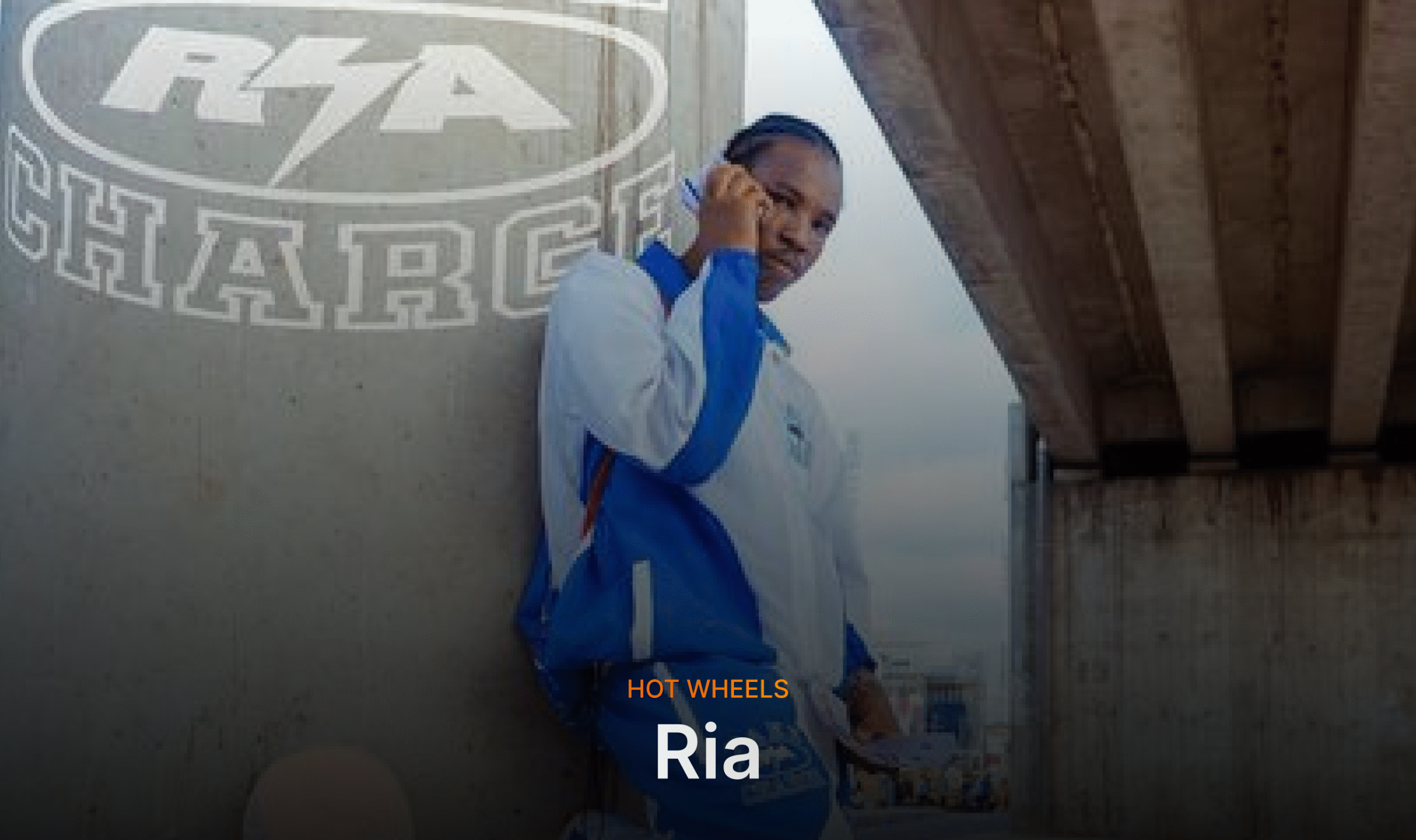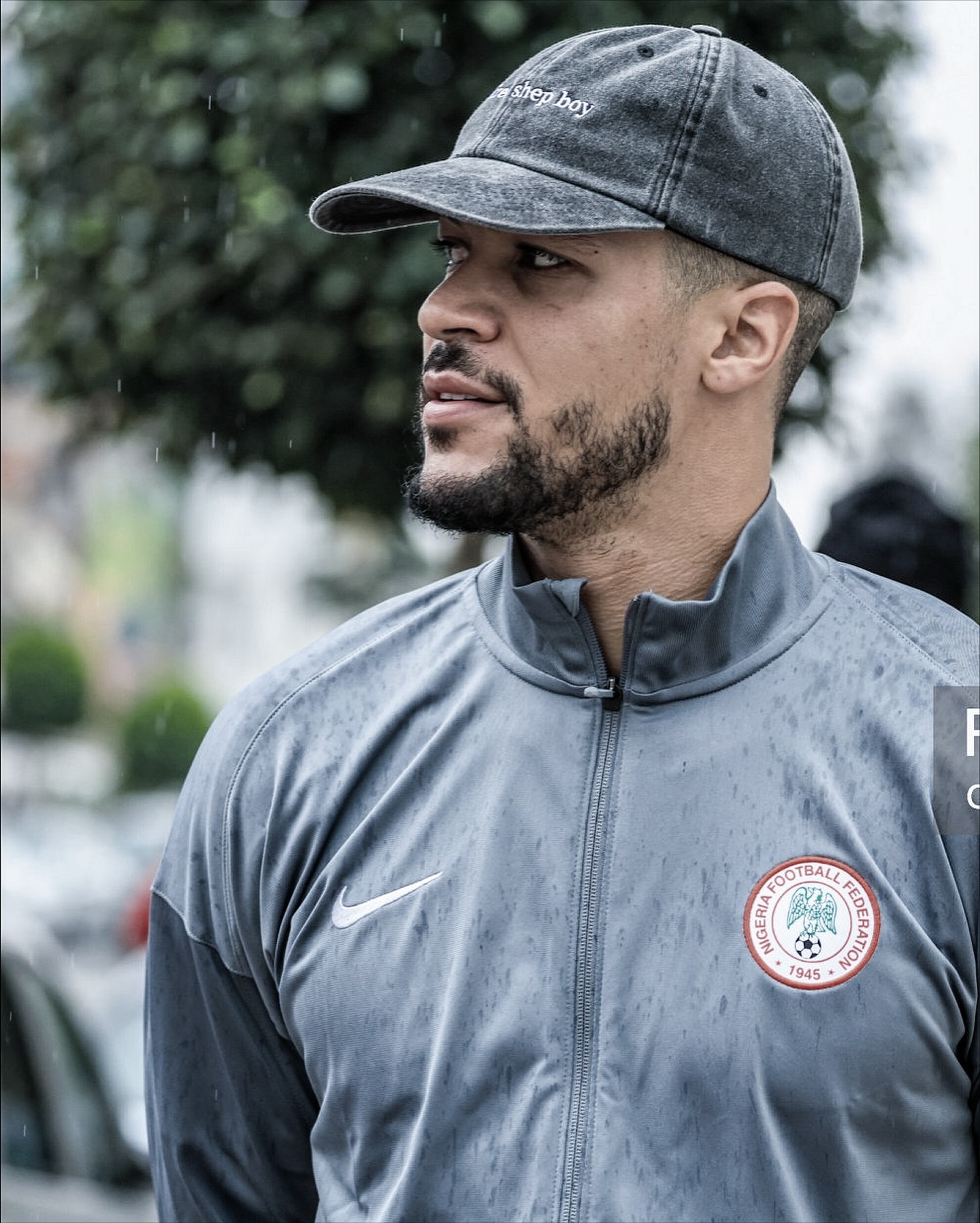Welcome to the third edition of HOT WHEELS, our spotlight series celebrating the fearless skaters shaping Nigeria’s street culture. From Lagos stadiums to roadside ramps, they’re redefining what it means to ride against the odds.
In this episode, we roll with Ria, a skater whose journey began with music videos and street fashion but evolved into a mission to build a thriving community for the next generation. Through RiaSk8 and RIA TakeCharge, he’s proving that skating in Nigeria isn’t just a sport — it’s a statement of creativity, grit, and identity.
What was your very first exposure to skateboarding? What was it about that moment or experience that made you say, “I have to try this?”
It came from music and fashion. I was a big Lil Wayne fan. I saw it for the first time in one of his videos on MTV Base. Through him, I got familiar with TRUKFIT, Bape, and Supreme.
What was it like learning to skate in Nigeria?
Skating in Naija is crazy; be ready for the unexpected always. One time, I had to pay the police to bail out our skateboards after we got arrested for skating.
Who were your earliest inspirations, both globally and perhaps locally, when you were starting out?
Globally, Lil Wayne and Stevie Williams. Locally, I’ll say the whole RiaSk8 team. Phopboy was the first person I saw in real life land a kickflip. Melo helped me a lot when I just started skating with the crew. He was my coach.
Do you remember your first skateboard, and what significance did it hold for you?
My first skateboard had wheels with lights, lol. I got it from a gym equipment store. Had to save for weeks to get it, each time I passed the front of the store, I always whispered to myself, “My board, I dey come for you soon.”
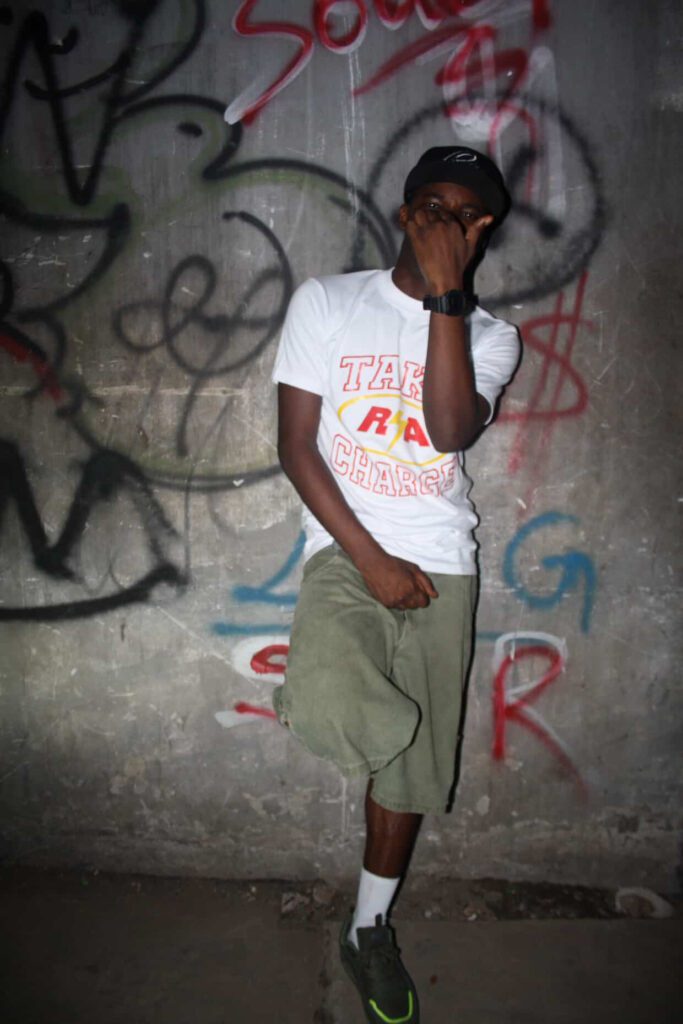
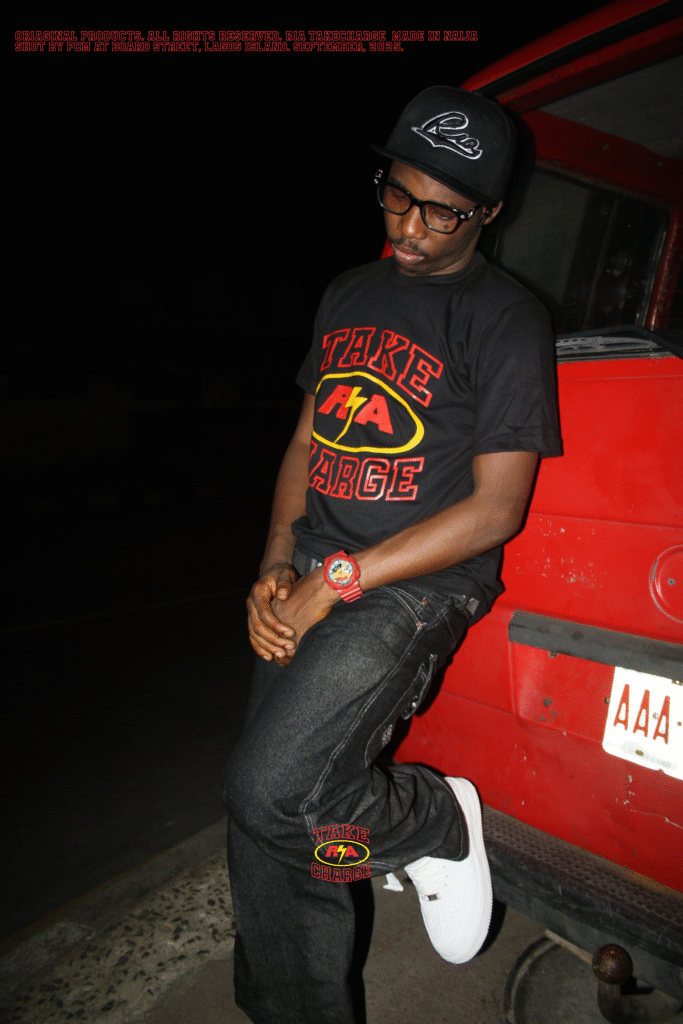
How would you describe your personal style of skating? Are there specific tricks, spots, or a general flow that defines ‘Ria?’
Style would be creative and fun skating. Mainly street skating. We, the RiaSk8 team, all started skating on the street, and the stadium was our base. The general flow that defines RiaSk8 is to take charge and take control. Don’t let the environment define who you are; use it to your advantage. We made Banana Peel, our own skate wax, so we can grind through rough surfaces easily. We also made Gbemidebe, our kicker ramp, to help communicate more with our rugged Naija streets.
What is the most memorable moment of your skating career so far, a specific trick landed, a competition, or perhaps an interaction with a fan?
My most memorable moment would be hosting and designing the merch for Bobby Ibo and Sea4EmGodz’s Song and EP release; they are both skateboarders. Also, when I landed my first heelflip, outside Freedom Park, I sent the video to almost all my friends lol.
Where are your favorite places to skate in Nigeria, and what makes those spots special? How do the surfaces, the atmosphere, and the local people contribute to your experience?
Definitely The Stadium; the dojo. Most of us met for the first time here, and it holds lots of memories for us. Landed most of our tricks for the first time here. We have a spot we share with dancers, BMXers, rollerbladers, and lots more I can’t remember right now. Almost everybody here understands how much hard work everyone puts into their skill, so it’s more friendly and easier to skate here compared to outside the stadium.
The Train station is also one of our favorite spots. Train station no mean say na inside o, We aren’t allowed to skate inside the train station, many times we have been told we can’t even sit by the stairs at the train station, just for holding skateboards, so we skate by the roadside where BRT buses park for repairs.
Also, being an extreme sport unlike the usual football and basketball everyone here is used to, some love it while most look at you like you lost your mind lol.
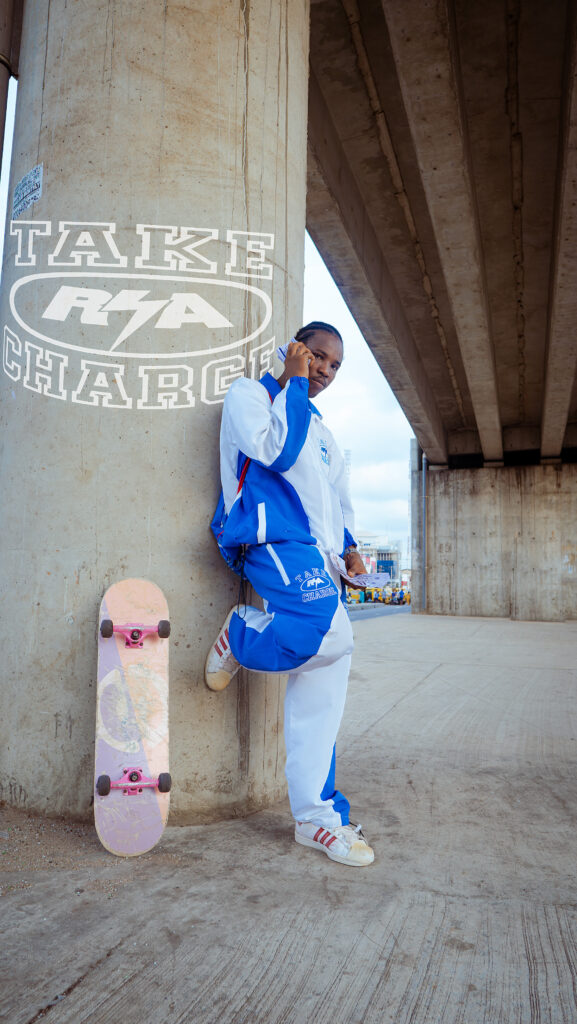
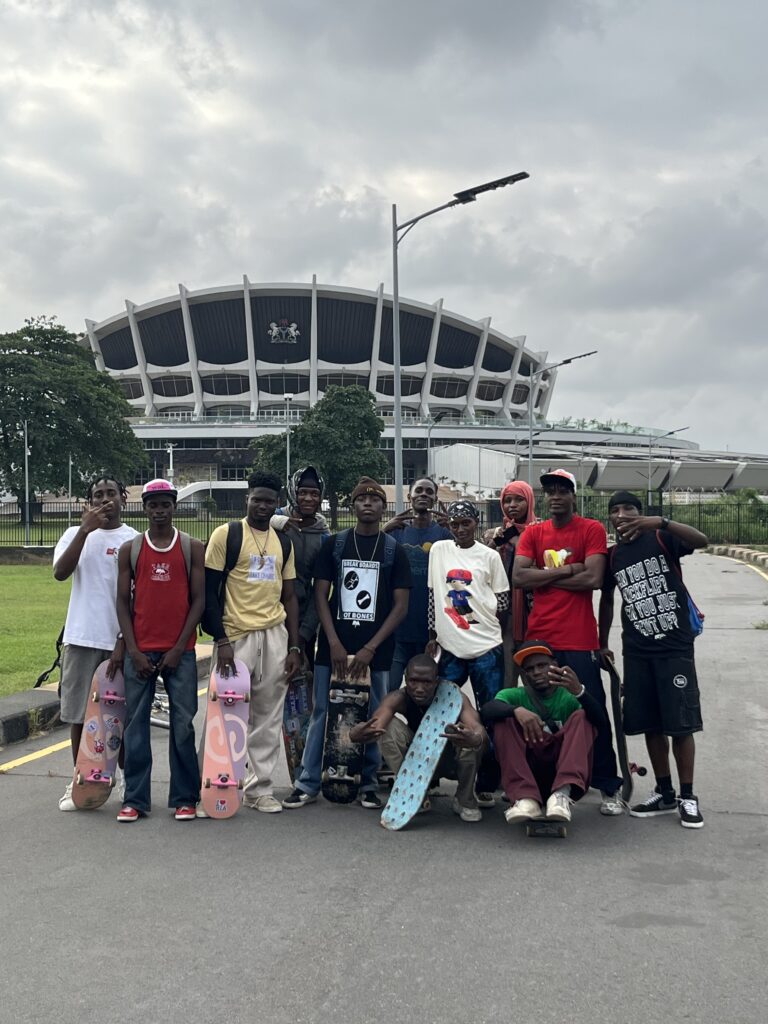
What is the biggest challenge you have faced in your skating career, and what lesson did you take away from overcoming it?
Every new trick, but with time and skating with friends, I end up figuring it out. You might not notice; it could be that the stance is wrong. Someone might point that out, and then you get it. Always listen to others at the park.
When did you realize you wanted to move beyond your own skating and start mentoring others?
It’s more of a collective idea. I wasn’t the only one who noticed the need for something that truly represents us all unfiltered. We all know what we’re capable of; we just needed a community to represent us.
What are the core values or lessons you try to instill in the young, upcoming skaters you mentor? Is it more about the sport or the life skills?
Have fun with it. Enjoy the process as much as the result. It’s more of a life skill than just a sport. You don’t always land a trick on the first try; it takes a lot of trial, patience, and consistency.
How do you see the Nigerian skate community evolving? What role do you hope your mentorship plays in shaping that future?
It’s evolving really fast; more people are becoming aware and interested in being part of the skateboarding community. I hope my mentorship helps lay a strong foundation for the next generation, one that breaks stereotypes and gives skaters the confidence to own their identity.
What are the most pressing needs of the young skaters you work with (e.g., equipment, safe spaces, funding)?
The most pressing need right now is funding to build better infrastructure that can withstand our rugged streets and support consistent practice. We also need access to essentials like proper shoes, safety gear, and even health insurance.
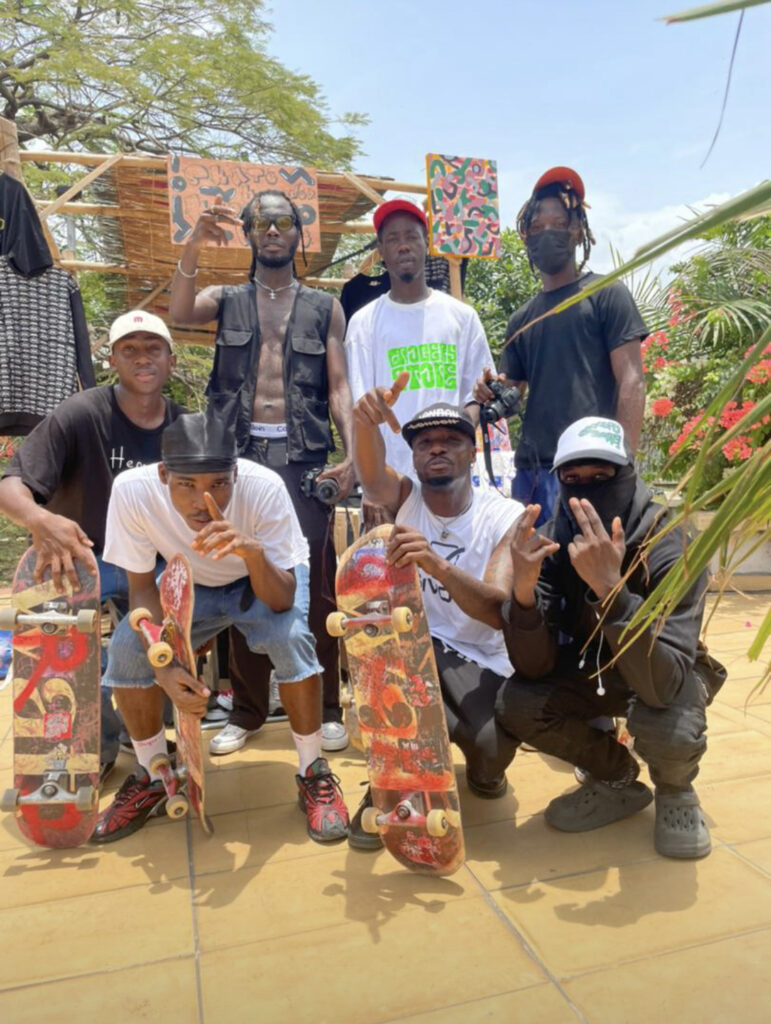
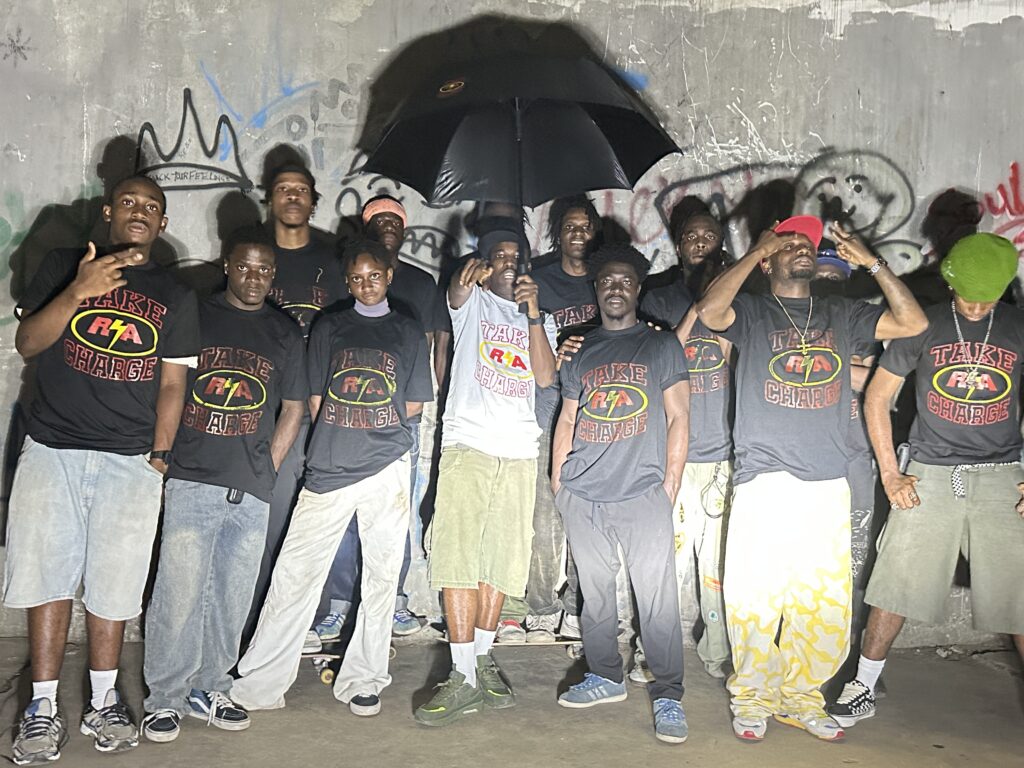
Beyond being a sport, how would you describe the culture of Nigerian skateboarding? How does it differ from international scenes?
The skateboarding culture here is still growing. People are just beginning to truly understand what it’s about. The difference is that, in Nigeria, skaters are often seen or treated as “people playing with fire”, instead of being recognized for the creativity, discipline, and community spirit behind what we do.
What does it mean to you to be a recognizable Nigerian skater?
Skateboarding is my personal way of having fun. I find real fulfillment in landing a trick and seeing my friends finally land the ones they’ve been working on. It also allows me to meet new people every day. It feels great to be recognized for doing what you genuinely love.
How much do art, music, or fashion intersect with your skating and your career? Are there Nigerian artists or creators you feel are a part of the skate ethos?
Art, music, and fashion are what drew me into skating; they complete the culture. I like to see them as elements: Art is water, music is air, fashion is fire, and skating is earth. Almost every skater I know is also an artist, writer, stylist, or designer. We naturally multitask and express ourselves across different creative forms.
When you look ahead 5 or 10 years, what do you hope your lasting legacy will be for the Nigerian skate scene?
I want to help build a community that welcomes everyone regardless of who they are or what they can afford. Through RIA TakeCharge, I hope to create opportunities for young skaters to access quality gear, clothes, and skating accessories, all produced with locally sourced materials. I also want to shift people’s perception of skateboarding, not as “playing with fire” or “a waste of time,” but as a legitimate, creative, and positive outlet for young people.
Are there international collaborations, competitions, or goals you are actively working towards?
I’d love to collaborate with a reputable and well-established brand to design a signature shoe for RiaSk8. I’ve actually had a few conversations about this with some of the team before. Hopefully, God Willing, it will become a reality.
If you could say one thing to someone in Nigeria who has never seen a skateboard but might be curious, what would it be?
Don’t buy that skateboard! Just kidding. Honestly, getting a skateboard could be one of the best decisions you’ll ever make. It teaches resilience; you might fall once, but you’ll get up four times stronger.
As the wheels keep spinning, Ria’s story reminds us that skateboarding in Nigeria is more than tricks and flips — it’s a culture powered by vision, resilience, and self-expression. From making homemade skate wax to mentoring young riders, he’s paving a smoother path for those who’ll come next.

